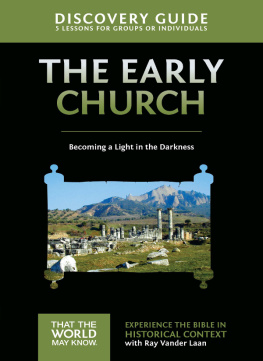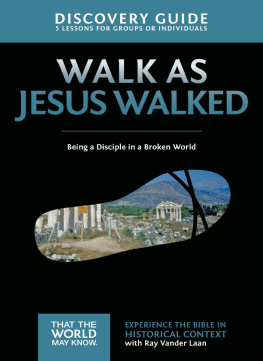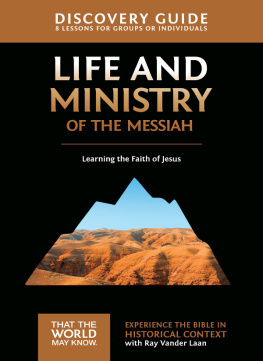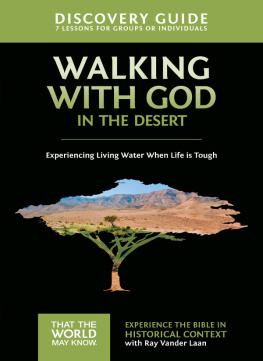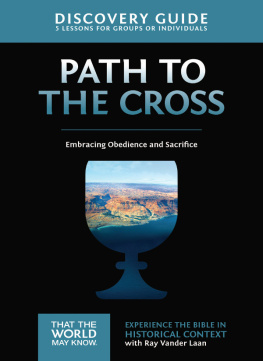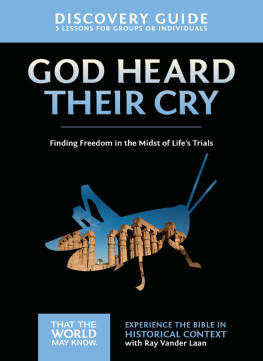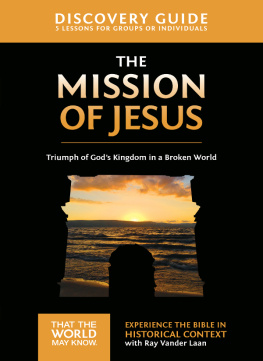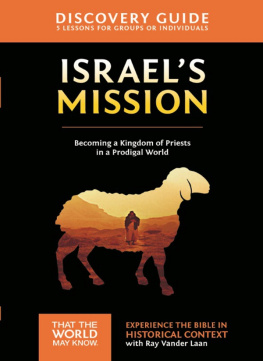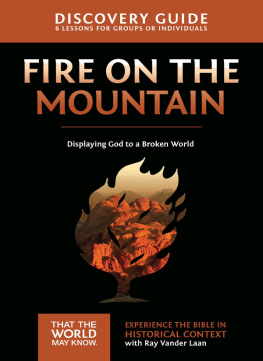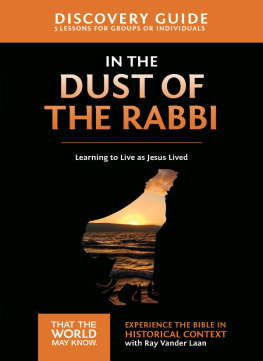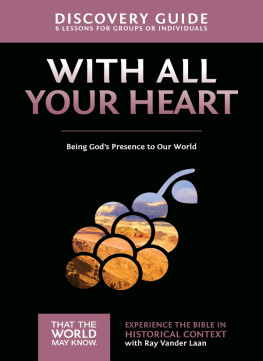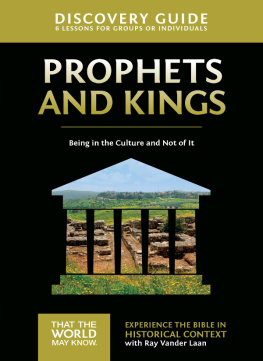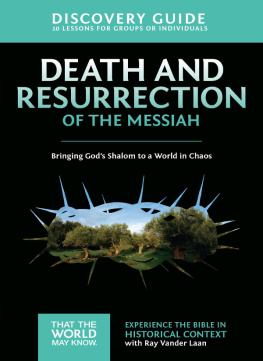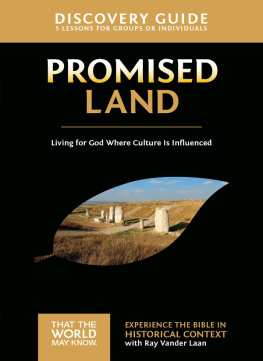That the World May Know with Ray Vander Laan
Volume 1: Promised Land
Volume 2: Prophets and Kings
Volume 3: Life and Ministry of the Messiah
Volume 4: Death and Resurrection of the Messiah
Volume 5: Early Church
Volume 6: In the Dust of the Rabbi
Volume 7: Walk as Jesus Walked
Volume 8: God Heard Their Cry
Volume 9: Fire on the Mountain
Volume 10: With All Your Heart
Volume 11: The Path to the Cross
Volume 12: Walking with God in the Desert
Volume 13: Israels Mission
ZONDERVAN
Early Church Discovery Guide
Copyright 2000, 2008 by Ray Vander Laan
Requests for information should be addressed to:
Zondervan, 3900 Sparks Dr. SE, Grand Rapids, Michigan 49546
Focus on the Family and the accompanying logo and design are federally registered trademarks of Focus on the Family, 8605 Explorer Drive, Colorado Springs, Colorado 80920.
That the World May Know is a trademark of Focus on the Family.
ePub Edition September 2015: ISBN 978-0-310-87963-3
All maps created by International Mapping.
All artwork is courtesy of Ray Vander Laan unless otherwise indicated.
All Scripture quotations are taken from The Holy Bible, New International Version, NIV. Copyright 1973, 1978, 1984 by Biblica, Inc. Used by permission. All rights reserved worldwide.
Any Internet addresses (websites, blogs, etc.) and telephone numbers in this book are offered as a resource. They are not intended in any way to be or imply an endorsement by Zondervan, nor does Zondervan vouch for the content of these sites and numbers for the life of this book.
All rights reserved. No part of this publication may be reproduced, stored in a retrieval system, or transmitted in any form or by any means electronic, mechanical, photocopy, recording, or any other except for brief quotations in printed reviews, without the prior permission of the publisher.
Cover design: DoMoreGood
Cover photography: BiblePlaces.com
Interior design: Ben Fetterley, Denise Froehlich
CONTENTS
Ebook Instructions
In this ebook edition, please use your devices note-taking function to record your thoughts wherever you see the bracketed instructions [Your Notes] or [Your Response]. Use your devices highlighting function to record your response whenever you are asked to checkmark, circle, underline, or otherwise indicate your answer(s).
Because God speaks to us through the Scriptures, studying them is a rewarding experience. Most of the inspired human authors of the Bible, as well as those to whom the words were originally given, were Jews living in the Ancient Near East. Gods words and actions spoke to them with such power, clarity, and purpose that they wrote them down and carefully preserved them as an authoritative body of literature.
Gods use of human servants in revealing himself resulted in writings that clearly bear the stamp of time and place. The message of the Scriptures is, of course, eternal and unchanging but the circumstances and conditions of the people of the Bible are unique to their times. Consequently, we most clearly understand Gods truth when we know the cultural context within which he spoke and acted and the perception of the people with whom he communicated. This does not mean that Gods revelation is unclear if we dont know the cultural context. Rather, by learning how to think and approach life as Abraham, Moses, Ruth, Esther, and Paul did, modern Christians will deepen their appreciation of Gods Word. To fully apply the message of the Bible to our lives, we must enter the world of the Bible and familiarize ourselves with its culture.
That is the purpose of this study. The events and characters of the Bible will be presented in their original settings. Although the DVD segments offer the latest archaeological research, this series is not intended to be a definitive cultural and geographical study of the lands of the Bible. No original scientific discoveries are revealed here. The purpose of this study is to help us better understand Gods revealed mission for our lives by enabling us to hear and see his words in their original context.
Understanding the World of the Bible
More than 3,800 years ago, God spoke to his servant Abraham: Go, walk through the length and breadth of the land, for I am giving it to you (Genesis 13:17). From the outset, Gods choice of a Hebrew nomad to begin his plan of salvation (that is still unfolding) was linked to the selection of a specific land where his redemptive work would begin. The nature of Gods covenant relationship with his people demanded a place where their faith could be exercised and displayed to all nations so that the world would know of Yahweh, the true and faithful God.
In the Old Testament, God promised to protect and provide for the Hebrews. He began by giving them Canaan a beautiful, fertile land where he would shower his blessings upon them. To possess this land, however, the Israelites had to live obediently before God. The Hebrew Scriptures repeatedly link Israels obedience to God to the nations continued possession of Canaan, just as they link its disobedience to the punishment of exile (Leviticus 18:24 28). When the Israelites were exiled from the Promised Land (2 Kings 18:11), they did not experience Gods blessings. Only when they possessed the land did they know the fullness of Gods promises.
By New Testament times, the Jewish people had been removed from the Promised Land by the Babylonians due to Israels failure to live obediently before God (Jeremiah 25:4 11). The exile lasted seventy years, but its impact upon Gods people was astounding. New patterns of worship developed, and scribes and experts in Gods law shaped the new commitment to be faithful to him. The prophets predicted the appearance of a Messiah like King David who would revive the kingdom of the Hebrew people. Even the Promised Land itself had changed, becoming home to many groups of people whose religious practices, moral values, and lifestyles conflicted with those of the Jews. Living as Gods witnesses took on added difficulty as Greek, Roman, and Samaritan worldviews mingled with that of the Israelites. But the mission of Gods people did not change. They were still to live so that the world may know that our God is the true God.
The Jewish Gospel in a Greek World
From the beginning, Gods plan was to reclaim his world. The Jewish people of the Bible had made God known to many of the nations of the world as people from those nations traveled through Israel. The Assyrian dispersion and the Babylonian exile spread God-fearing Jewish people around the known world. Many of them returned to Jerusalem for the yearly feasts that God had commanded. God had prepared carefully and well for the next stage in his great plan of salvation: his people must now live so that the world may know in all the world not just in one small place.
Gods people would reveal him to people in places such as Rome, Athens, and the cities of Roman provinces such as Syria and Macedonia. The most pagan of all provinces, Asia Minor, would become a stronghold for the followers of God and the Messiah Jesus. They would serve him while the nations of the world watched and listened.
The triumph of the Christian faith is nowhere more striking or unexpected than in the Roman province of Asia Minor. Known for immorality in lifestyle and in religious practice, this region became Christian within 150 years of Jesus ministry in Israel. The early missionary, Paul (Saul in Hebrew), spent a great deal of time here and wrote several letters to the followers of Jesus in this province. Peter wrote his letters to the believers here, and John wrote Revelation (and his letters) to the churches of this province. The effectiveness of the early believers is amazing and raises a host of questions with great implications for our world today. How did Jesus prepare his followers for such a mission? What empowered them? What kind of commitments did they have to make to their mission? What did they do that had such an impact on the people of Asia? Some answers to these questions become clear when we study the biblical stories in the context in which they occurred.
Next page
